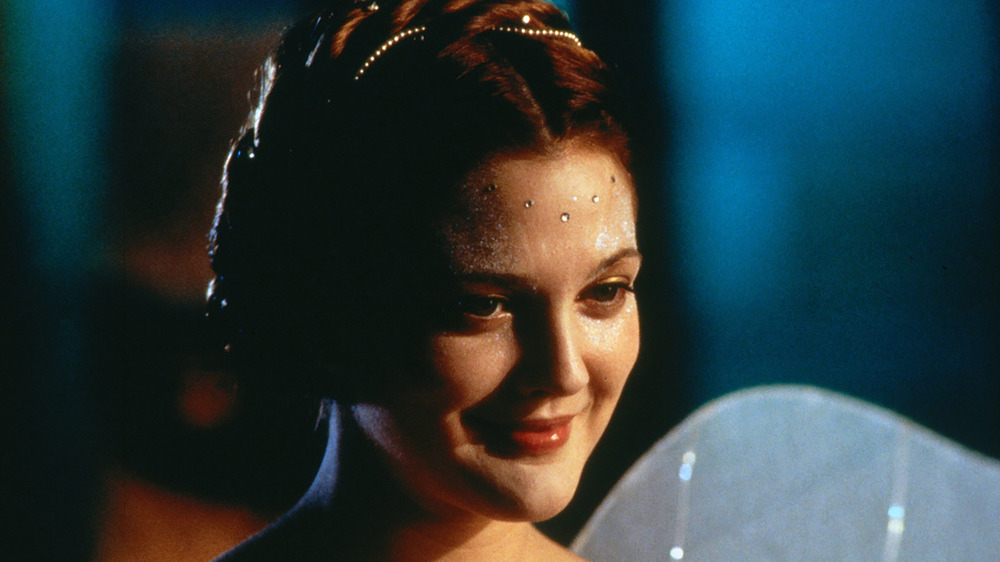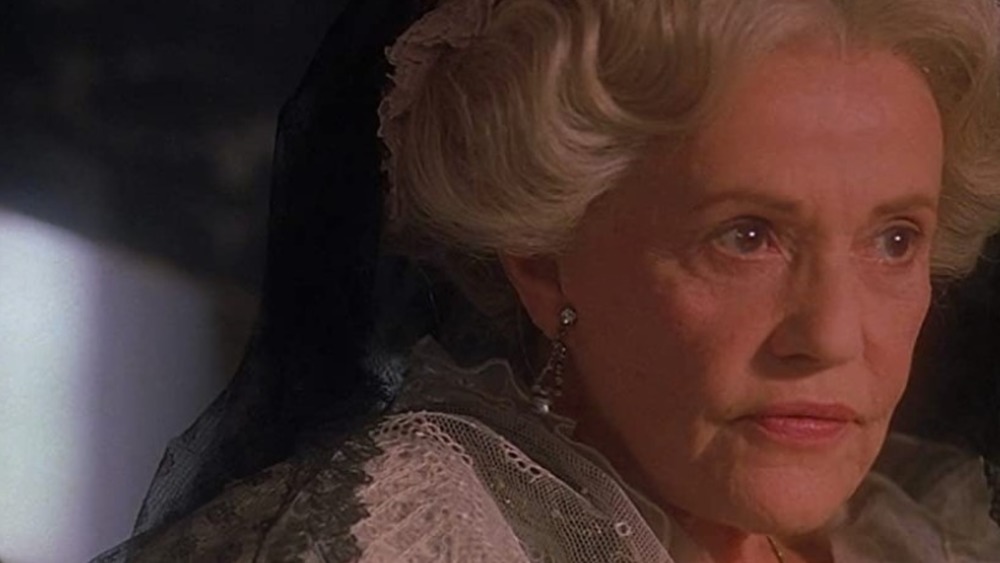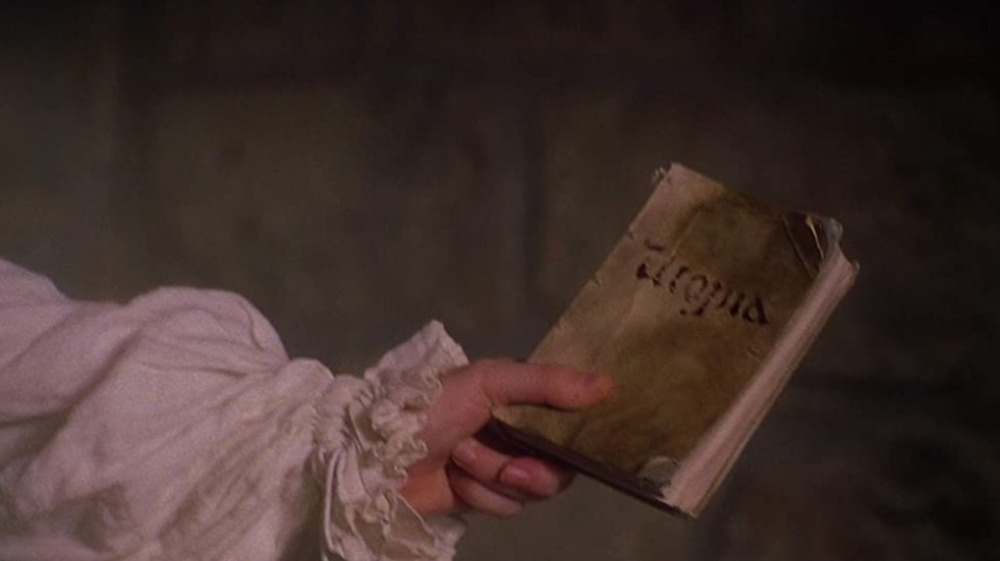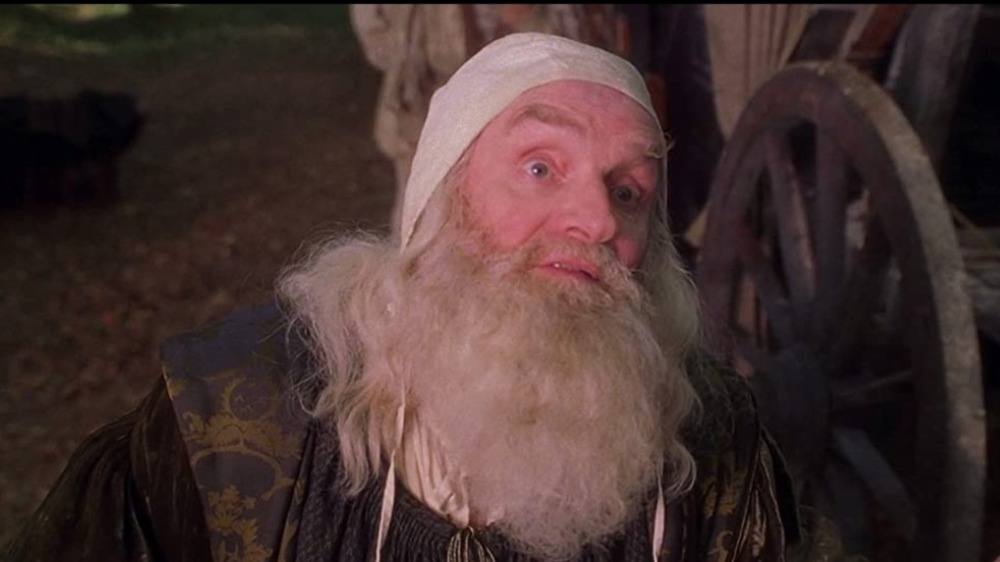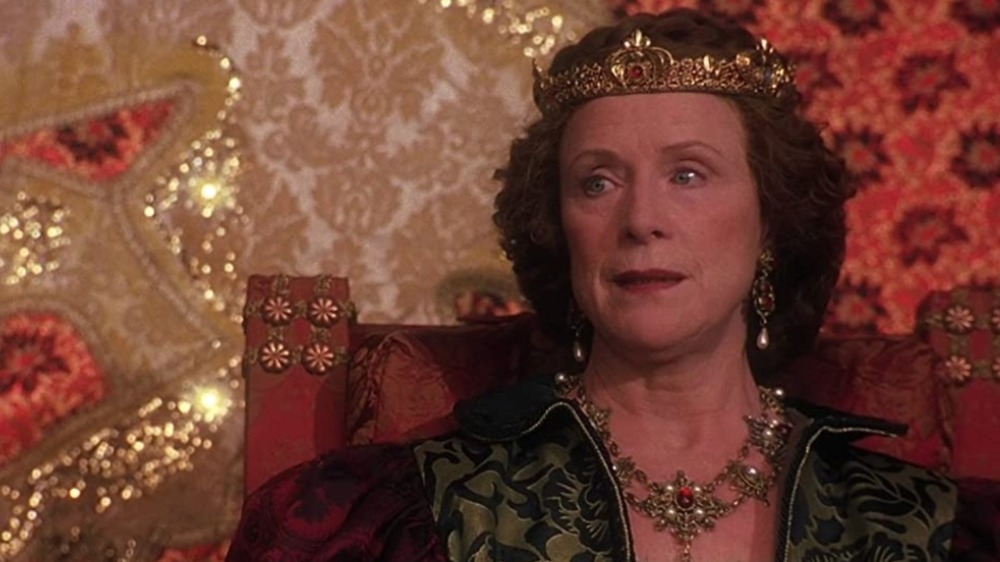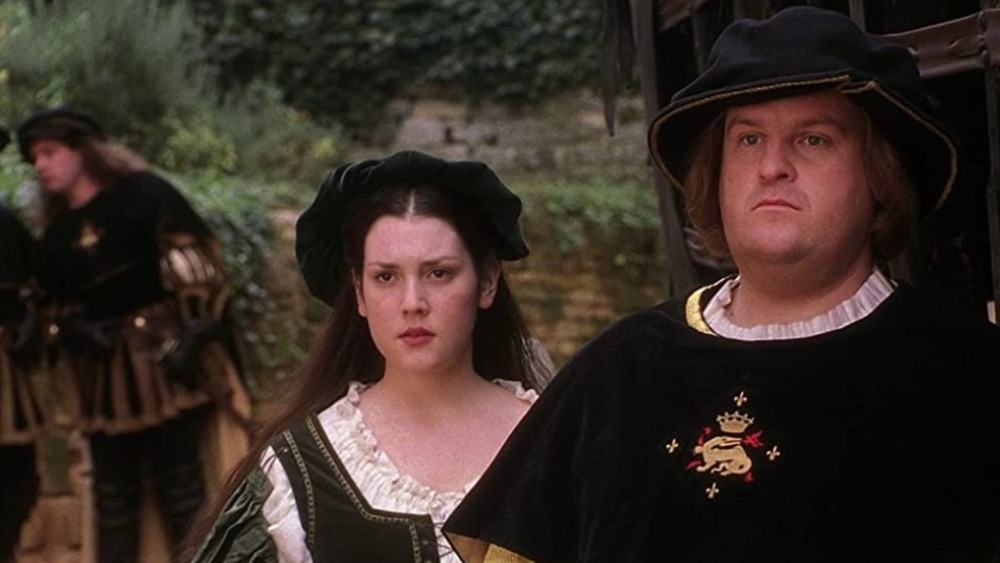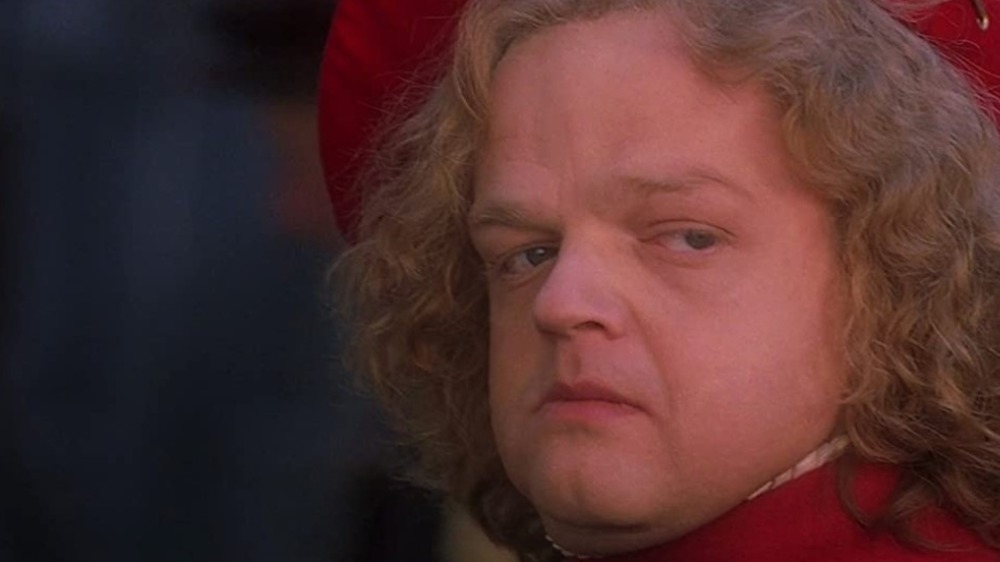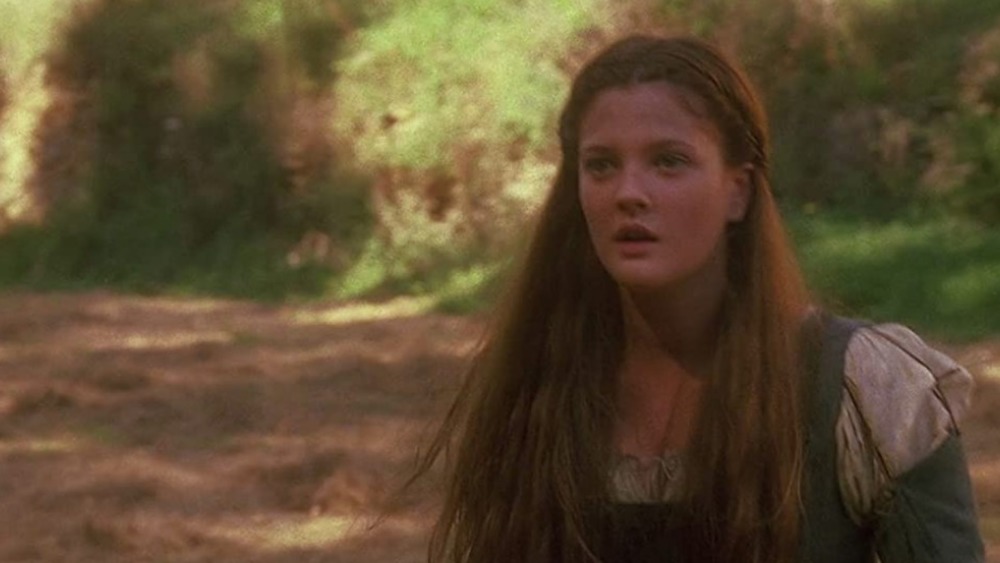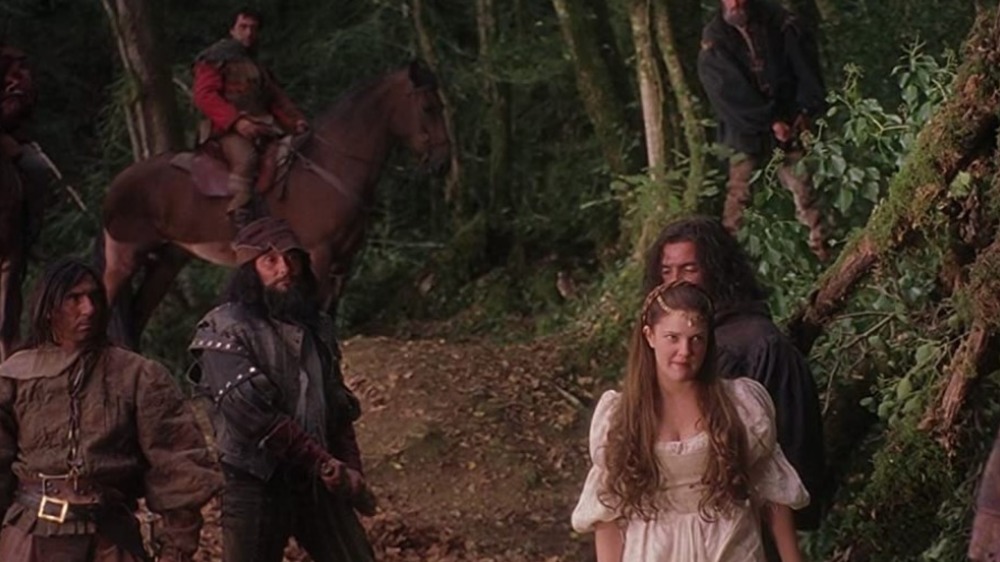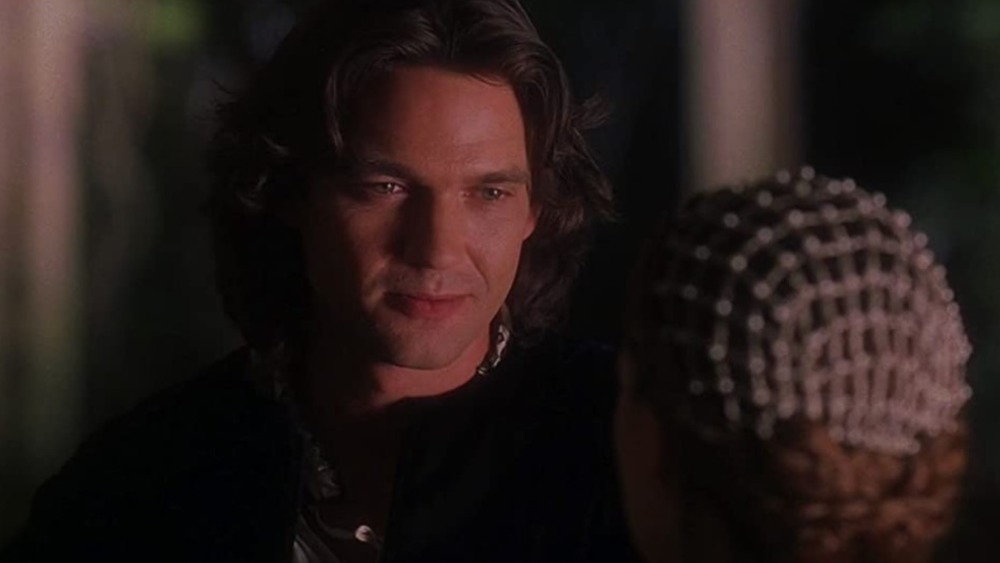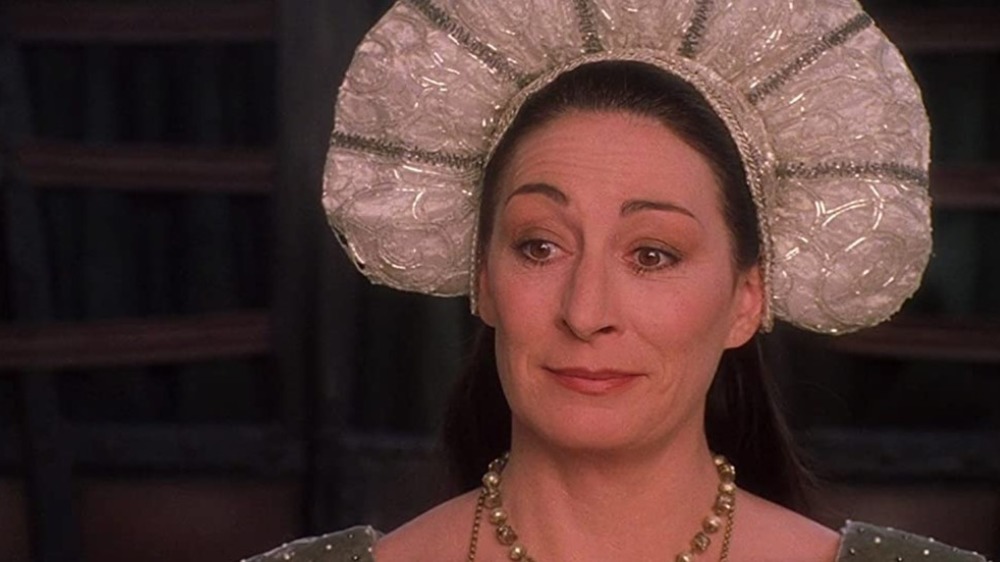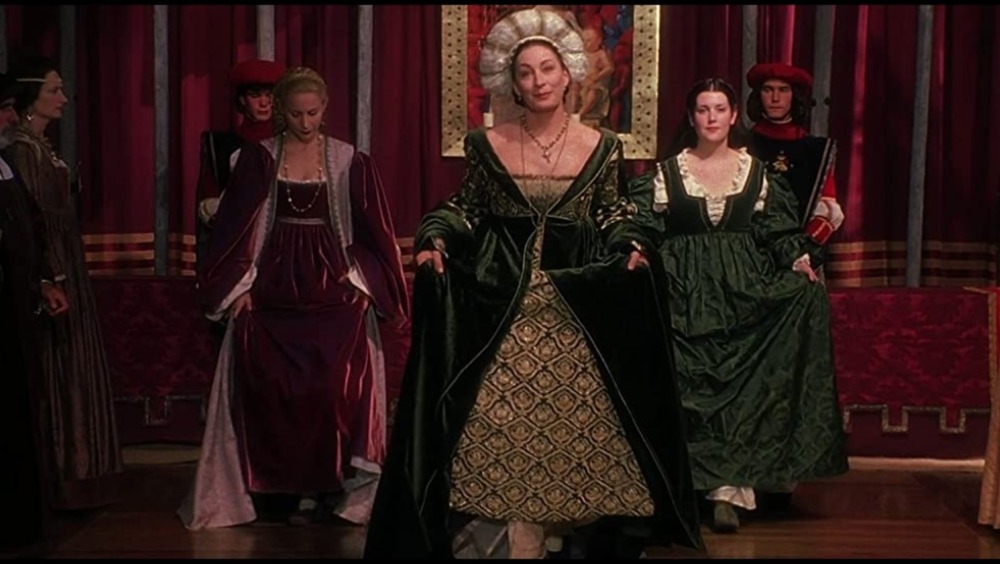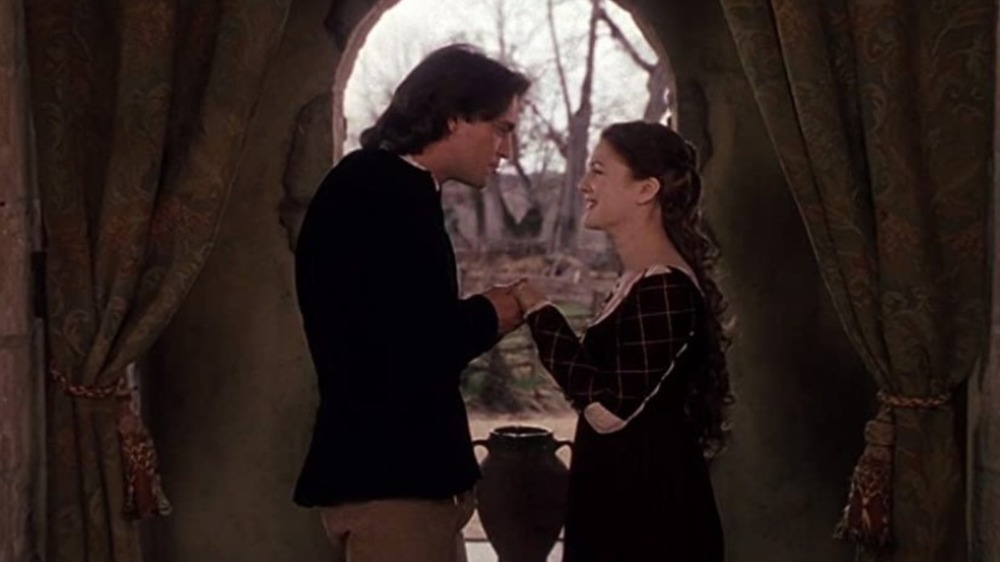Things Only Adults Notice In Ever After
Drew Barrymore captivated audiences as Elliott's little sister in 1982's E.T. the Extraterrestrial. But she says that Danielle, the progressive young woman who challenges a prince about his politics and philosophies in 1998's Ever After: A Cinderella Story, wears the crown as her favorite role. The script proposes that Grimms' fairy tales were wrong and that Cinderella rescued herself, connecting with the actress and producer at a time when she wanted to reinvent herself in her 20s. As Barrymore put it, "And I thought, 'Rescue yourself? That's who I want to be, that's who I need to be in this life.'"
Ever After enthralled critics and audiences, grossing $65 million worldwide and earning dazzling reviews. Now available for streaming on Disney+, it's a rare princess film that grants its protagonist a happy ending without any "Bibbidi Bobbidi Boo," just old-fashioned romantic magic. As Barrymore said, "[R]escuing yourself is the ultimate fairy tale ... And we all want love at the end of the day. We want the prince, but if you get yourself up to that mountain instead of him carrying you up there, it's just that kiss is all the sweeter." Imagined as a "frothy twist on the ancient fable" for tweens and teens, Ever After also has a few surprises in its sparkly slippers to intrigue and enchant adults. Note: Spoilers ahead.
French cinematic royalty
The setup of Ever After is that the "little cinder girl" whom French author Charles Perrault and the Brothers Grimm centered in their fairy tales was a real person, with a slipper made not of glass, but elaborate beading (by designer Salvatore Ferragamo, no less). The film opens in 19th century France, with the Grande Dame meeting with the Brothers Grimm at her castle. She wants to set the record straight about her great-great-grandmother, Danielle de Barbarac (Barrymore), who lived during the Renaissance era and whose story they co-opted.
Ever After sprinkles real people and references to actual history throughout the story (some of them not quite accurate). These historic touches help cast a spell around the fictional romance between Danielle and Prince Henry (Dougray Scott, Fear the Walking Dead). The film gets off on the right foot by casting legendary French actress Jeanne Moreau as the Grande Dame. Moreau notably starred in director François Truffaut's 1962 film Jules et Jim but also worked with a number of Hollywood heavyweights, including Orson Welles, Louis Malle, Luis Buñuel, and Elia Kazan. She provides a luminous introduction to a couple who lived once upon a time.
A slice of "Utopia"
Danielle's mother dies before the story opens, leaving her in the care of her doting father (Jeroen Krabbé), who loves reading to her when he's not traveling. His last gift to her before he dies is Sir Thomas More's Utopia, which Danielle often reads by the fire late into the night, earning snide remarks from her stepsisters for being covered in soot and ashes. Danielle receives the book in 1502, although it wasn't published until 1516. Nevertheless, More's socio-political satire contributes to her egalitarian views and forges an intellectual connection with Henry.
Danielle first meets Henry when she tries to stop him from taking one of their horses and throws an apple at his head. She doesn't recognize the prince wrapped in his cloak at first; he hastily drops some gold coins on the ground for the horse. Soon afterward, Henry doesn't recognize her as she pretends to be a noblewoman, dressed in one of her mother's gowns. Danielle offers the coins for the release of a family servant whom her stepmother (Anjelica Huston) sold to pay off a debt. The money fails to persuade the servant's jailer, but Henry intervenes after Danielle quotes More: "If you suffer your people to be ill-educated, and their manners corrupted from infancy, and then punish them for those crimes to which their first education disposed them, what else is to be concluded, sire, but that you first make thieves and then punish them?"
An artistic godfather
Danielle doesn't have a fairy godmother, but she and Henry do receive some advice and assistance from Renaissance man Leonardo da Vinci. Patrick Godfrey (A Room with a View, The Count of Monte Cristo) plays da Vinci with sprightly humor, arriving in the story as the artist in residence at Henry's castle. His talents awe everyone around him, but da Vinci is humble. "I'm merely a second choice," he says, explaining that Michelangelo is "trapped under a ceiling in Rome," an allusion to the painting of the Sistine Chapel ceiling.
Da Vinci gives Henry a nudge when the younger man seeks some romantic advice: "You cannot leave everything to fate, boy. She's got a lot to do. Sometimes you must give her a hand." The film's da Vinci paints a portrait of Danielle (modeled after the real da Vinci painting La Scapigliata) and also gives her wings of encouragement for her costume at the masquerade ball. Kudos to Ever After's costume designer Jenny Beavan (an Oscar winner for Mad Max: Fury Road) for modeling them after those of da Vinci's flying machines.
A scandalous divorce
An arranged marriage helps kick off the plot of Ever After. When Prince Henry takes off with a horse from Danielle's property, he's fleeing a marriage that his parents, King Francis (Timothy West) and Queen Marie (Judy Parfitt), have arranged to Princess Gabriella of Spain. Princess Gabriella isn't keen on marrying Henry, either, as a later scene humorously makes clear. Once back at the palace, Henry works out a compromise that gives him some say in his future: He'll choose a bride by the upcoming masquerade ball, or he'll marry Gabriella. The king and queen agree, although their banter is one of a long-married pair who have had their share of bumps over the years. "Choose wisely, Henry," the queen advises. "Divorce is only something they do in England."
Younger viewers wouldn't catch the reference, but we'd bet that she's referring to England's Henry VIII divorcing Catherine of Aragon so that he could marry one of her ladies-in-waiting, Anne Boleyn. Ever After's romance between Danielle and Henry begins in 1512, and Henry VIII asked the pope for a divorce in 1527, so the timing doesn't align, but Henry VIII's situation was so scandalous for its day, it's impossible to imagine the film refers to anything else.
Best supporting stepsister
Danielle has two stepsisters who, just like in Cinderella, initially treat her as a servant. The blonde Marguerite (Megan Dodds of CSI: NY) is the older and cattier of the two, smacking the table like a toddler in the morning over not having the properly timed eggs. Younger sister Jacqueline (Melanie Lynskey) seems to follow in Marguerite's spoiled footsteps, but over the course of the film, she softens toward Danielle, especially after their mother, Rodmilla, orders Danielle whipped for disobedience.
It's a performance of quiet assertiveness from Lynskey, who made her film debut at 17 as a teenage killer in 1994's Heavenly Creatures, and has since built a career of strong supporting roles. The versatile Lynskey has tackled dramas, comedies, and horror with roles like Julie, the younger sister to George Clooney's corporate downsizer in Up in the Air, the "boundary challenged" Rose on Two and a Half Men, the sweet-voiced but cranky bluebird Beatrice in the Cartoon Network miniseries Over the Garden Wall, and the telepathic realtor Molly Strand in Hulu's Castle Rock.
An American debut of a multifaceted actor
British actor Toby Jones has become a familiar face in film and TV, starring as writer Truman Capote in 2006's Infamous and appearing in dramas and thrillers such as W., Frost/Nixon, and Tinker Tailor Soldier Spy. He's also earned a lot of pop culture cred, with roles as diverse as a Dream Lord in Doctor Who, the conniving Dr. Arnim Zola in Marvel's Captain America: The Winter Soldier and Captain America: Civil War, the auctioneer of genetically engineered dinosaurs in Jurassic World: Fallen Kingdom, the voice of the Librarian in The Dark Crystal: Age of Resistance, and snooty announcer Claudius Templesmith in the Hunger Games franchise. (His frequent slogan: "And may the odds be ever in your favor!") Jones had been working for about five years on British films and TV series before landing the part of a duplicitous royal page in Ever After, his American film debut. Whenever Rodmilla flirts his way and coyly promises more, his enamored page slips the sly stepmother tips about Henry's whereabouts.
A standout color
Once the palace announces plans for the masquerade ball, Rodmilla and her daughters fly into a tizzy, eager to find something stunning to wear. As they sort through various gowns, Marguerite rejects a pale blue one, saying, "Fifty other girls will be wearing the same color." As Rodmilla praises her daughter's shrewdness for recognizing she needs to stand out, viewers likely will remember that Disney's animated Cinderella in 1950 and the live-action version in 2015 both caught the prince's eye in pale blue ball gowns.
Further proof that the clothes don't make the woman? Danielle's connection to blue. She wears blueish-green when doing chores around her family's property, and she accompanies Henry to a monastery library in the same pale blue gown that Marguerite rejects. When her turn in the spotlight at the ball comes, she's wearing a white beaded dress that once belonged to her mother, along with those gorgeous slippers and da Vinci's custom wings that appear blue from the lighting behind her.
Carrying modern and historical references
Part of Ever After's appeal is how it blends modern touches and a historical setting. After their date visiting the monastery library, Henry's carriage wheel breaks, so Danielle suggests they walk. They soon become lost, to Henry's frustration. "You would think I would know the way to my own castle," he says. The resourceful Danielle climbs a tree to get her bearings. "Why is it men never ask for directions?" she taunts as Henry marvels from the ground.
"You swim alone, climb rocks, rescue servants. Is there anything you don't do?" he asks. "Fly," she replies, flinging her arms out at her sides and foreshadowing her wings at the ball.
While Danielle is aloft, a group of Romani bandits tries to rob Henry. He insists that they let her go, but Danielle doesn't want to leave him to their mercies. She asks the leader if she can have his word that she can have anything she can carry, then lifts Henry over her shoulders as a firefighter would. The moment reenacts a Medieval legend recounting the time German King Conrad III placed the castle at Weinsberg under siege and the women inside negotiated their release. The king promised they could take whatever they could carry, so they carried out their husbands, much to his amusement. Like the king, the bandit leader proves as true to his word and even offers Danielle and Henry a horse and his friendship.
Some thoughts on responsibility
Ever After has its own twist on the idea that every Spider-Man fan can quote: With great power comes great responsibility. As Henry gets to know Danielle, he confides that he doesn't really want to be king. "To never be seen as who you are but what you are. You have no idea how insufferable that is," he says.
Danielle counters that's not much different from how others view the Romani people, or others of low social status in the kingdom. But Henry is fortunate enough to be born into privilege where he has the power to enact change, something the prince in his melancholy hadn't considered. "I think that the best aspect of power is that you have some leverage to make things better, and that's something we talk about in this film when it comes to royalty, what a fortunate position that is to be in, and not because of what is on the exterior but because you can change the world," Barrymore said when promoting the film.
Painful subtext
Oscar-winner Anjelica Huston (Prizzi's Honor) seems to be having fun as Danielle's stepmother, Rodmilla, hitting humorous notes much like she does in her performances as Morticia Addams in the Addams Family franchise of the 1990s (although Morticia is arguably kinder). Even so, a class act like Huston doesn't completely embrace camp. She seems genuinely hurt when Danielle's father dies soon after their wedding, his dying words being, "I love you" to his daughter.
While it's petty to hold that against a child, there's a moment of subtext about halfway through the film that indicates that's exactly what Rodmilla has been doing. "You have so much of your father in you," she says. "Sometimes I can almost see him looking out through your eyes." Rodmilla quickly undercuts how touched Danielle feels by the compliment by adding that her features are "so masculine." But when Danielle keeps the conversation going, asking if Rodmilla loved her father, Rodmilla can't meet her eyes. "Well, I barely knew him. Now go away. I'm tired," she replies.
A grimmer ending
Much like in the animated Cinderella, Danielle and Henry experience a crisis at the ball but eventually wind up together. Henry proposes with the shoe that she inadvertently leaves behind. He then introduces Danielle as his wife to her stunned stepmother and stepsisters, scolding Rodmilla for her own lies. To punish her, Danielle asks the king and queen to "show her the same courtesy that she has bestowed upon me." The royals strip Rodmilla of her title of baroness and order her and Marguerite to work in the palace laundry. The kinder Jacqueline presumably keeps her noblewoman status, having started a romance with one of Henry's guards.
That ending seems tamer than their fate in the Brothers Grimm's version of the story, where doves pluck out the stepsisters' eyes. But perhaps the screenwriters were just more subtle. The chemicals used in laundry in those days often resulted in vision loss after prolonged exposure.
A charming prince
Although Ever After veers considerably from its original fairy tale, it slips in a few name drops along the way. Early in the film, Marguerite taunts Danielle by calling her "Cinderella" because of her chore-dirtied clothes and her habit of falling asleep by the fire. No one actually renames Henry "Prince Charming," but Danielle references how much he delights her shortly before the credits roll.
After the drama at the masquerade ball, Henry rushes to ask Danielle's forgiveness, only to learn that Rodmilla has packed her off to a lecherous neighbor. The prince rides to the rescue, but true to her independent spirit, Danielle frees herself, pulling a sword on the man and negotiating her own freedom. The surprised but elated Henry proposes: "I kneel before you not as a prince, but as a man in love. But I would feel like a king if you, Danielle de Barbarac, would be my wife."
Danielle, of course, agrees and adorably admits how much he makes her swoon. "You, sir, are supposed to be charming," she says after they're married. Her husband replies, "And we, princess, are supposed to live happily ever after."
